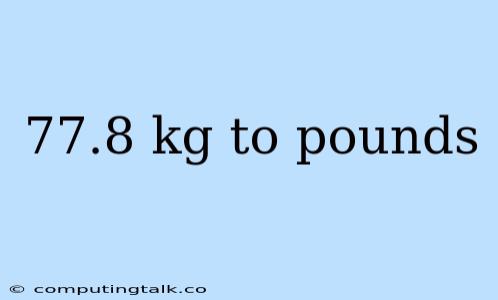Converting Kilograms to Pounds: A Simple Guide
Have you ever found yourself needing to convert kilograms to pounds? Whether you're buying groceries, tracking your weight, or comparing measurements for a recipe, knowing how to convert between these units is essential.
Understanding Kilograms and Pounds
Kilograms (kg) and pounds (lb) are both units of weight or mass. A kilogram is the standard unit of mass in the metric system, while a pound is the standard unit of mass in the imperial system.
The Conversion Factor
The conversion factor between kilograms and pounds is 2.20462. This means that 1 kilogram is equal to 2.20462 pounds.
How to Convert Kilograms to Pounds
There are two ways to convert kilograms to pounds:
1. Manual Calculation:
To convert kilograms to pounds manually, simply multiply the number of kilograms by 2.20462. For example:
- 77.8 kg * 2.20462 = 171.5 lb
2. Using an Online Converter:
Many online conversion tools can convert kilograms to pounds quickly and easily. Simply search for "kilogram to pound converter" on your favorite search engine.
Tips for Conversion
- Remember the conversion factor: Always keep in mind that 1 kilogram is equal to 2.20462 pounds.
- Use a calculator: For more complex calculations, use a calculator to ensure accuracy.
- Round to the nearest tenth: When dealing with everyday conversions, rounding to the nearest tenth of a pound is usually sufficient.
Examples
- A person weighs 77.8 kg. What is their weight in pounds?
- Answer: 77.8 kg * 2.20462 = 171.5 lb
- A recipe calls for 2 kg of flour. How much is that in pounds?
- Answer: 2 kg * 2.20462 = 4.41 lb
- A bag of rice weighs 5 lb. How much is that in kilograms?
- Answer: 5 lb / 2.20462 = 2.27 kg
Conclusion
Converting kilograms to pounds is a simple process that can be done manually or using an online converter. By understanding the conversion factor and using the right tools, you can easily convert between these two units of mass. Remember to keep the conversion factor in mind and round your answers to the nearest tenth for everyday conversions.
